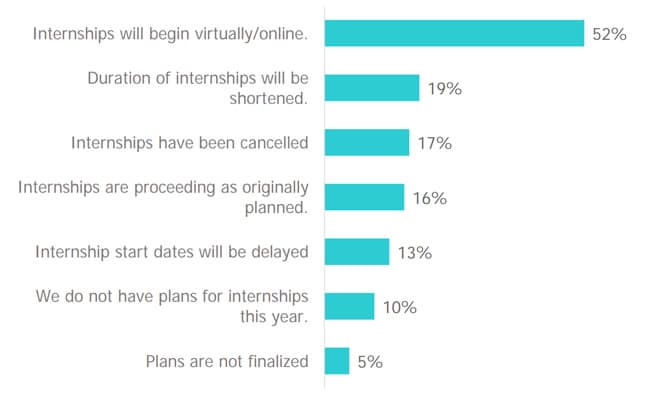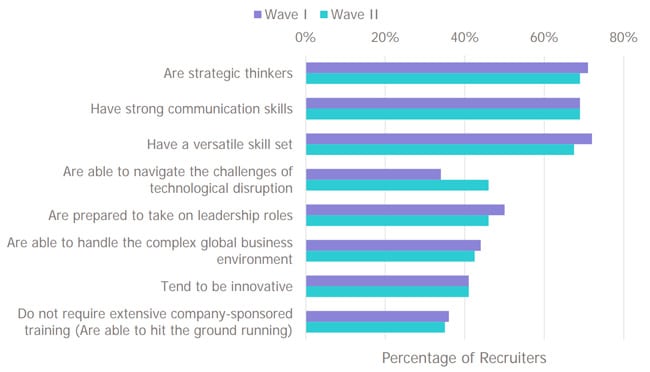Employment outlook steady for business master’s graduates into 2021
- Corporate recruiters continue to place a high value on the skills of graduates with advanced business degrees
- Employers continue to rely on the strategic thinking and communications skills of these graduates, but are placing a greater emphasis on their ability to adapt to technological disruption this year
An annual survey of major employers finds that corporate recruiters retain a high degree of confidence in the abilities of business master's graduates this year. Most are also maintaining their hiring plans for graduates of advanced business programmes, and the skills of business master's graduates are expected to be in sharp demand during the economic recovery from the pandemic.
The 2020 edition of the Graduate Management Admission Council's (GMAC) Corporate Recruiters Survey drew its initial survey responses from 17 February through 17 March, just as the full scale of the pandemic was becoming clearer. In an attempt to measure the disruption caused by the pandemic, a second round of survey data was collected from 17 June to 17 July. Interestingly, the responses from recruiters are fairly consistent over those two survey "waves."
"Even before the pandemic, concerns were emerging about the strength of the global economy, which only deepened subsequently," says GMAC. "One of the key takeaways from the research is that even as the pandemic continues to shake the global economies and shape the future of work, the confidence of corporate recruiters in the skills and abilities of graduate management talent remains strong." (Fully nine in ten respondents to the GMAC survey said they were highly confident or confident of the ability of graduate business schools to prepare students to be successful.)
Also of note is that the hiring plans of corporate recruiters are largely holding steady through the mid-point of this year. In the second survey wave over June and July, only 8% said they were rescinding job offers to business master's graduates. More common was that employers were delaying start dates for new hires (32%) during COVID-19 while another three in ten (29%) said they were freezing hiring this year.
Hiring intentions with respect to international graduates were similarly stable over the two survey waves. And companies also indicated that they were proceeding as planned with placements for business school interns, albeit with many (52%) expecting to move to virtual internships this year.

“GMAC’s research shows that even as the pandemic resets the global economy and job market, the confidence of corporate recruiters in the skills and abilities of graduate management talent is strong,” said Rahul Choudaha, director of Industry Insights at GMAC. “This aligns with 2021’s robust MBA hiring projections as organisations plan for their recovery in a post-COVID world which demands meta-skills integral to managerial talents such as versatility and strategic thinking.”
Skills in demand
Corporate recruiters say they value business master's graduates most for their strategic thinking and communications skills, but also because those graduates are seen to have a versatile skill set.

The second wave of the GMAC survey in June and July reveals that, as the pandemic continues this year, employers are placing an even greater emphasis on ability of business graduates to "navigate the challenges of technological disruption." Nearly seven in ten respondents (68%) said that that adaptability to technological change was even more important this year.
"MBA and business master’s graduates are not immune to the scale and scope of the uncertainty caused by the pandemic," concludes GMAC. "However, the findings of the 2020 Corporate Recruiters Survey suggest that employers remain confident about the value of graduate management talent, which is also apparent in their relatively steady hiring projections and salary trends. In sum, the skills and abilities acquired by graduate management talent during their business school experiences make them a valuable asset in supporting organisational recovery and resiliency."
For additional background, please see:
















